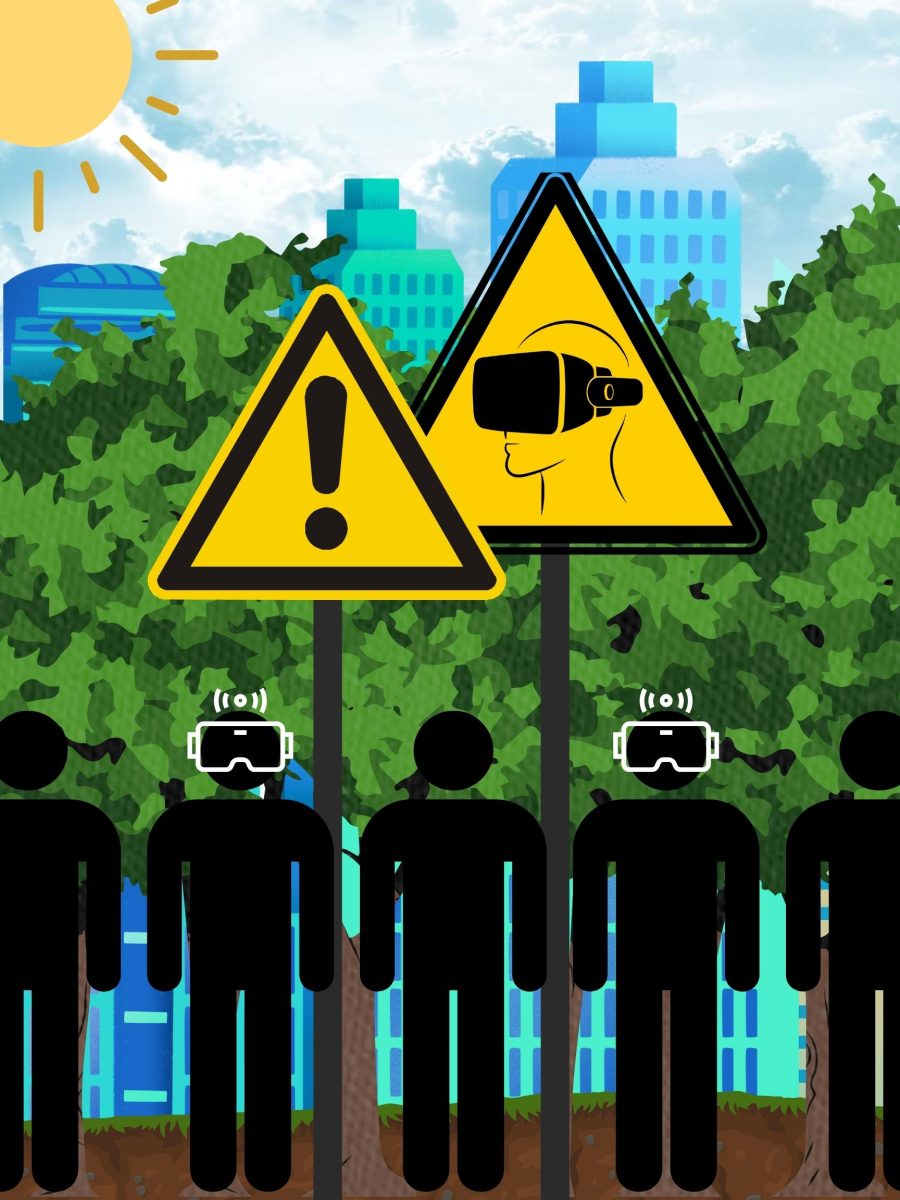Have you ever watched your favorite movies and scrolled through social media, all while hosting a DJ concert on the beaches of Malibu? If not, it’s possible now. The Apple Vision Pro is a hybrid of virtual and augmented reality, wherein users can actively open digital screens in the real world with a simple glance. It serves as an extension of the internet, allowing users to open websites, text chats, Facetime calls, photos, and immersive environments for films. Apple’s new advancements and interest in virtual reality certainly signify a new direction for technology; however, is this a beneficial change, or a risk that could lead the world down a dystopian fate?
According to Apple, the “Vision Pro is the result of decades of experience designing high‑performance, mobile, and wearable devices — culminating in the most ambitious product Apple has ever created.” After creating a headset that offers 2.5 hours of battery life, equipped with precise eye tracking and an advanced spatial audio system, Apple’s pride in its first-ever headset is certainly justified.
But just how advanced is the Apple Vision Pro within the competitive scope of VR?
A more well-known headset in the virtual world is the Meta Quest, previously known as the Oculus Quest. Similar to the Vision Pro, the Meta Quest creates a safety barrier around the user that sends warnings in case of a possible collision with the real world. Although the Meta Quest does not have advanced eye tracking, it still allows access to the internet with numerous windows. This headset truly shines with its great advancements in the realm of video games. Users can easily interact within a large community on numerous public games, such as combat, board, or sports activities. Compared to the Apple Vision Pro, the Meta Quest certainly lacks versatility; nevertheless, it makes up for this with high-quality entertainment across a variety of genres.
As a VR fan myself, I cannot help but balk at the eye-watering $3500 price of the Apple Vision Pro, compared to the newest $500 Meta Quest. The gap in modern tech between these two headsets is not overwhelming, and the high price of the Vision Pro certainly deters the interest of the average consumer.
However, the true importance of the Vision Pro lies in Apple’s decision to enter the virtual reality competition. This company’s technological prowess and staying power is evident in the laundry list of household items we know and own today: iPads, iPhones, Apple Watches, AirPods, and much more. Apple’s development of the Vision Pro illuminates its new angle of focus on technology, where society may bring more attention to the development of virtual reality.
Apple recently announced that the Apple Vision Pro successor will arrive late 2025 or early 2026, a fast follow-up that not only shows the company’s ambition and dedication to the project but also foretells the rapid development of virtual reality itself. With screens now floating in the air and technology quite literally at our fingertips, I myself am excited to see the future of virtual reality. But some students at Hackley express their concerns of an upcoming dystopia.
Junior Alex Booth, who is familiar with virtual reality, is one of such students. In his eyes, this rapid advancement may actually pose a threat in the future.
“I think it should stay within its realm of gaming. For it to become part of life and interfere with people,” he said, “I just would like to think there are a lot of other people who are suspicious of this.”
These worries are justifiable, as we have enough sci-fi horror films circling the collective consciousness. However, I believe that worrying about the advancement of technology is misplaced. The continuous modernization of communication, photography, and transportation has revealed how the development of new technology is already swift and inevitable. The question is not ‘how do we deter the advancement of technology’, but instead ‘how do we maintain a healthy relationship with it’. One’s ability to differentiate the virtual landscape from the real world will become a necessary skill in the years to come.
According to Alex, “The longer virtual reality advances, the more difficult it will be for humanity to resist it. But I think as long as we’re able to wake each other up, it’s possible… after all, nothing lasts forever.”







